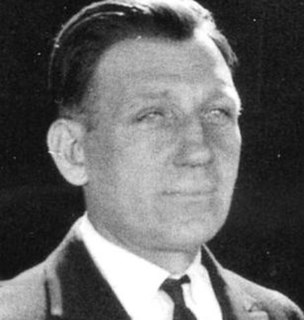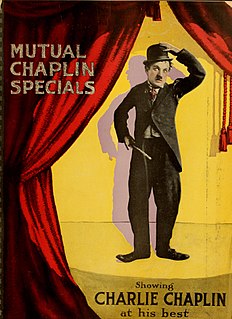Related Research Articles
The Motion Picture Patents Company, founded in December 1908 and terminated seven years later in 1915 after conflicts within the industry, was a trust of all the major US film companies and local foreign-branches, the leading film distributor and the biggest supplier of raw film stock, Eastman Kodak. The MPPC ended the domination of foreign films on US screens, standardized the manner in which films were distributed and exhibited within the US, and improved the quality of US motion pictures by internal competition. But it also discouraged its members' entry into feature film production, and the use of outside financing, both to its members' eventual detriment.

Warner Bros. Entertainment Inc., is an American diversified multinational mass media and entertainment conglomerate headquartered at the Warner Bros. Studios complex in Burbank, California, and a division of AT&T's WarnerMedia. Founded in 1923 by brothers Harry, Albert, Sam, and Jack Warner, the company established itself as a leader in the American film industry before diversifying into animation, television, and video games, and is one of the "Big Five" major American film studios, as well as a member of the Motion Picture Association (MPA).

Universal Pictures is an American film studio owned by Comcast through the NBCUniversal Film and Entertainment division of its wholly owned subsidiary NBCUniversal. Founded in 1912 by Carl Laemmle, Mark Dintenfass, Charles O. Baumann, Adam Kessel, Pat Powers, William Swanson, David Horsley, Robert H. Cochrane, and Jules Brulatour, it is the oldest surviving film studio in the United States; the world's fifth oldest after Gaumont, Pathé, Titanus, and Nordisk Film; and the oldest member of Hollywood's "Big Five" studios in terms of the overall film market. Its studios are located in Universal City, California, and its corporate offices are located in New York City.

A major film studio is a production and distribution company that releases a substantial number of films annually and consistently commands a significant share of box office revenue in a given market. In the American and international markets, the major film studios, often simply known as the majors, are commonly regarded as the five diversified media conglomerates whose various film production and distribution subsidiaries collectively command approximately 80–85% of U.S. box office revenue. The term may also be applied more specifically to the primary motion picture business subsidiary of each respective conglomerate.

An independent film, independent movie, indie film or indie movie is a feature film or short film that is produced outside the major film studio system, in addition to being produced and distributed by independent entertainment companies. Independent films are sometimes distinguishable by their content and style and the way in which the filmmakers' personal artistic vision is realized. Usually, but not always, independent films are made with considerably lower budgets than major studio films.

Samuel Louis "Sam" Warner was an American film producer who was the co-founder and chief executive officer of Warner Bros. He established the studio along with his brothers Harry, Albert, and Jack L. Warner. Sam Warner is credited with procuring the technology that enabled Warner Bros. to produce the film industry's first feature-length talking picture, The Jazz Singer. He died in 1927, the day before the film's enormously successful premiere.
The Biograph Company, also known as the American Mutoscope and Biograph Company, was a motion picture company founded in 1895 and active until 1916. It was the first company in the United States devoted entirely to film production and exhibition, and for two decades was one of the most prolific, releasing over 3000 short films and 12 feature films. During the height of silent film as a medium, Biograph was America's most prominent film studio and one of the most respected and influential studios worldwide, only rivaled by Germany's UFA, Sweden's Svensk Filmindustri and France's Pathé. The company was home to pioneering director D. W. Griffith and such actors as Mary Pickford, Lillian Gish, and Lionel Barrymore.
United States v. Paramount Pictures, Inc., 334 U.S. 131 (1948), was a landmark United States Supreme Court antitrust case that decided the fate of film studios owning their own theatres and holding exclusivity rights on which theatres would show their movies. It would also change the way Hollywood movies were produced, distributed, and exhibited. The Supreme Court affirmed in this case that the existing distribution scheme was in violation of the United States antitrust law, which prohibit certain exclusive dealing arrangements.

William Nicholas Selig was a pioneer of the American motion picture industry. In 1896 he created one of the first film production companies, Selig Polyscope Company of Chicago. By 1908, he established one of the first major studios in Los Angeles.

Abraham "Albert" Warner was an American film executive who was one of the founders of Warner Bros. He established the production studio with his brothers Harry, Sam, and Jack L. Warner. He served as the studio's treasurer, until he sold his stock in 1956.
The star system was the method of creating, promoting and exploiting stars in Hollywood films. Movie studios would select promising young actors and glamorise and create personas for them, often inventing new names and even new backgrounds. Examples of stars who went through the star system include Cary Grant, Joan Crawford, and Rock Hudson.
The Independent Moving Pictures Company (IMP) was a motion picture studio and production company founded in 1909 by Carl Laemmle. The company was based in New York City, with production facilities in Fort Lee, New Jersey. In 1912, IMP merged with several other production companies to form Universal Film Manufacturing Company, later re-named Universal Pictures Company with Laemmle as president.

Mutual Film Corporation was an early American film conglomerate that produced some of Charlie Chaplin's greatest comedies. Founded in 1912, it was absorbed by Film Booking Offices of America, which evolved into RKO Pictures.

Film Booking Offices of America (FBO), also known as FBO Pictures Corporation, was an American film studio of the silent era, a producer and distributor of mostly low-budget films. It was founded in 1920 as Robertson–Cole (U.S.), the American division of a British import–export company formed by the English-born Harry F. Robertson. Robertson-Cole bought the Hallmark Exchanges from Frank G. Hall in 1920. Exhibitors-Mutual/Hallmark had distributed Robertson-Cole product, and acquiring the exchanges gave them the right to distribute their own films plus Hall's product, with the exception of Charlie Chaplin reissues which he had the rights to.

The Chicago film industry is a central hub for motion picture production and exhibition that was established before Hollywood became the undisputed capital of film making. In the early 1900s, Chicago boasted the greatest number of production companies and filmmakers. Essanay Studios founded by George K. Spoor was one of the earliest successful studios to produce movies in Chicago, employing stars such as Charlie Chaplin and Gloria Swanson. Actor and co-founder of Essanay Studios, Broncho Billy Anderson gave birth to the western genre. Early film companies such as Essanay Studios produced multiple silent films every week and rented viewing equipment to showcase the latest cinematography to the public. This rental culture gave birth to the popularity of Nickelodeons up until the Great Depression. However, due to the high demand for motion pictures during this time, a black market for films and equipment developed. The Motion Picture Patents Company, established in 1909 as a conglomerate of the major studios, sought to eliminate all illegal use of patented film equipment. As a result, independent ventures entered the film scene. Independents drove the film industry to the west to avoid legal trouble with the trust of major film companies united under the Motion Picture Patents Company. The west offered fairer weather and scenery that better accommodated film making. Not until the 1980s and early 21st century has Chicago experienced a film production revival. Blockbusters, such as Blues Brothers, Sixteen Candles, and The Dark Knight, have rejuvenated the Chicago film scene. In the 21st century, Chicago further experienced a film revival due to a tax bill the state of Illinois passed to give filmmakers a 30% tax break on production costs.

The General Film Company was a motion picture distribution company in the United States. Between 1909 and 1920, the company distributed almost 12,000 silent era motion pictures.
A film studio is a major entertainment company or motion picture company that has its own privately owned studio facility or facilities that are used to make films, which is handled by the production company. Most firms in the entertainment industry have never owned their own studios, but have rented space from other companies.

The American Film Manufacturing Company, also known as Flying “A” Studios, was an American motion picture production company. In 1915, the formal name was changed to the American Film Company.

United States v. Motion Picture Patents Co. , 225 F. 800, was a civil antitrust prosecution overlapping to some extent with the issues in the decision in the Supreme Court's Motion Picture Patents case. After the trial court found that the defendants violated §§ 1 and 2 of the Sherman Act by establishing control over "trade in films, cameras, projecting machines, and other accessories of the motion picture business," by their patent licensing practices and other conduct, they appealed to the Supreme Court. After the Supreme Court's 1917 decision in Motion Picture Patents Co. v. Universal Film Manufacturing Co., however, the parties dismissed the appeal by stipulation in 1918' that decision had made the defendants' appeal futile.

The Champion Film Company was an independent production company founded in 1909 by Mark M. Dintenfass. The studio was one of the film companies that merged to form Universal Pictures.
References
- Larry Widen. "John Freuler and Harry Aitken: Local Boys Make Good." Milwaukee History. 2000. Accessed on March 3, 2005.
- Robert Sklar (1994). Movie-Made America: A Cultural History of American Movies. Vintage Books. ISBN 0-679-75549-7.
| This article about an American film distributor or production company is a stub. You can help Wikipedia by expanding it. |